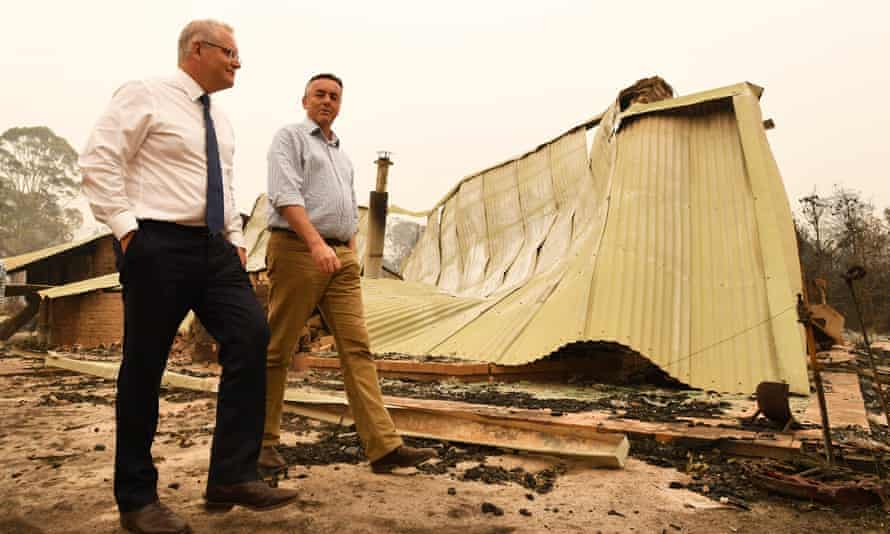Extract from The Guardian
Federal minister says regional Australia is ‘not just about farmers’ and party must represent diverse views.

Last modified on Thu 11 Feb 2021 20.16 AEDT
Victorian Nationals MP, Darren Chester, has warned his party to listen to its diverse heartland and be “part of the solution” when it comes to practical environmentalism and emissions reductions rather than “sideline ourselves from big debates”.
The federal veterans’ affairs minister used an interview on Sky News on Thursday to push back at National party colleagues who declared they would cross the floor if the prime minister, Scott Morrison, tried to legislate a mid-century net zero commitment.
The Nationals leader and deputy prime minister, Michael McCormack, also suggested on the weekend that agriculture could be exempted from the emissions reduction task.
While prefacing his observations by saying he wasn’t a commentator on the recent contributions of colleagues, Chester noted farmers in his regional electorate were “open to the conversation” about whether sequestering carbon in soil presented an opportunity “and we need to have it with them”.
The Coalition frontbencher said he backed the direction Morrison was taking. He said Australia needed to pursue “a technology-based approach to reducing emissions which doesn’t unfairly hurt sectors of the community and particularly regional Australians”.
Chester said the Paris agreement already required countries to reach net zero emissions “by the second half of the 21st century, and the prime minister said his preference is to get there sooner rather than later with a technology-based approach rather than a taxation-based approach”.
He said Nationals needed to listen to the sentiment within their communities and represent the interests of their constituents.
“It’s important we take our time to listen to what people are saying to us, and even in the agricultural sector there are very different views,” Chester said.
“I have farmers in my electorate who are very interested to know whether this technology approach around sequestering more carbon in soils provides a real opportunity for them. They are open to the conversation.
“My job is to reflect the views of the community. I would just simply say we’ve got to be part of the solution as a National party – we don’t want to sideline ourselves from big debates.”
Chester said the National party had four ministries in the cabinet and that represented an opportunity to project the views of its heartland into major policy debates such as climate policy. Then, he said, it was incumbent on Nationals MPs to “work with our colleagues in a collegiate way to find a resolution to a big global challenge”.
He stressed the Nationals should remember “regional Australia is not just about farmers”.
“In the electorate of Gippsland I have more nurses than farmers, we have a lot of teachers, a lot of professionals and small business owners in my community, and they have different views.
“Most of the people I talk to in my community, they want to see us have reliable, affordable energy and make a contribution to practical environmental management, and that is through things like emissions reduction and also land care and coast care and bushfire hazard reduction. They are very keen to see us being responsible global citizens.”
In a separate interview on Sky News on Thursday, the deputy Nationals leader and agriculture minister, David Littleproud, said the party did not want to “sign up to a platitude” for a “warm fuzzy feeling”.
While the National party has roiled, organisations like the National Farmers Federation have signalled they want a seat at the policymaking table during the transition to low emissions.
Littleproud said Nationals needed to know what the transition plan was – and it was dangerous to sign up to something without knowing how to get there and who would pay.
“We are the last barrier, the last line of defence for regional and rural Australia, and for our primary producers,” he said, arguing agricultural producers had already done heavy lifting on climate policy.
“What you’ve got to appreciate is there is a lot of fatigue on this issue – not only here but globally. There’s about 130-odd nations that have signed up to net zero by 2050 but only 16 of them have given a clear enunciation of a pathway to achieve it. Now is not a time for more platitudes but a time for honesty.”
Littleproud also warned against the growing push for carbon border tariffs – which are being considered by the EU, US and UK – arguing such measures would complicate international trade and could be “weaponised as a tool for protectionism”.
The trade minister, Dan Tehan, said on Thursday the Australian government would work to “ensure that carbon tariffs don’t become a new form of protectionism”.
Tehan, a Liberal MP, said the government wanted to ensure “that engagement on climate change and meeting emissions reduction targets is done in a way that is constructive for global free trade and investment relationships between nations”.
No comments:
Post a Comment